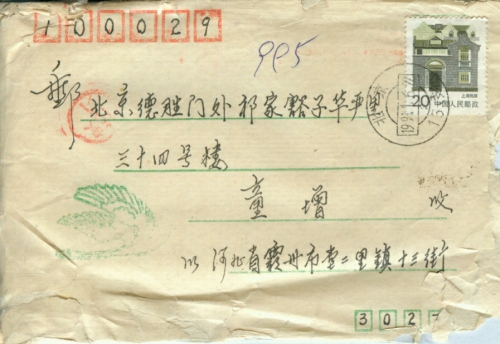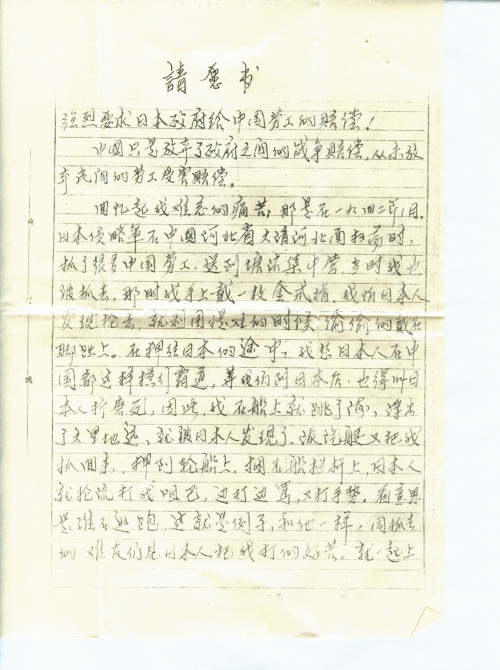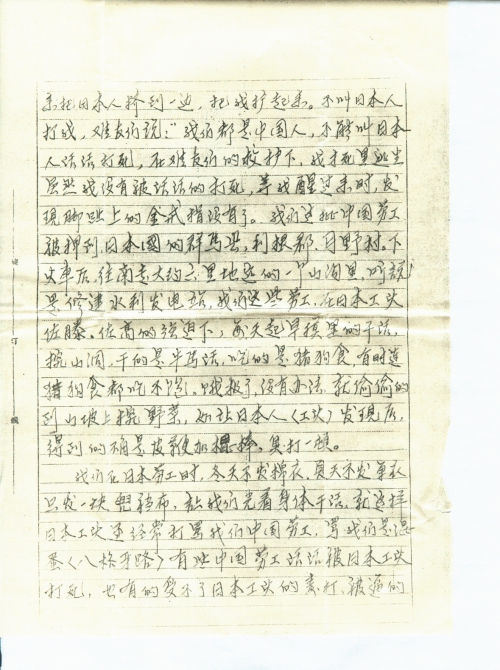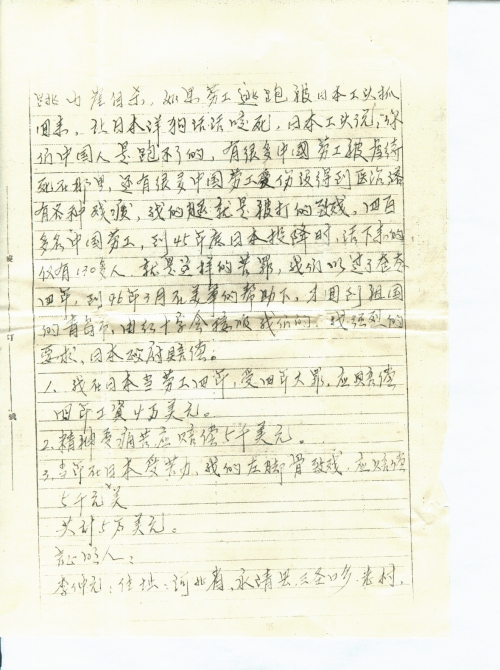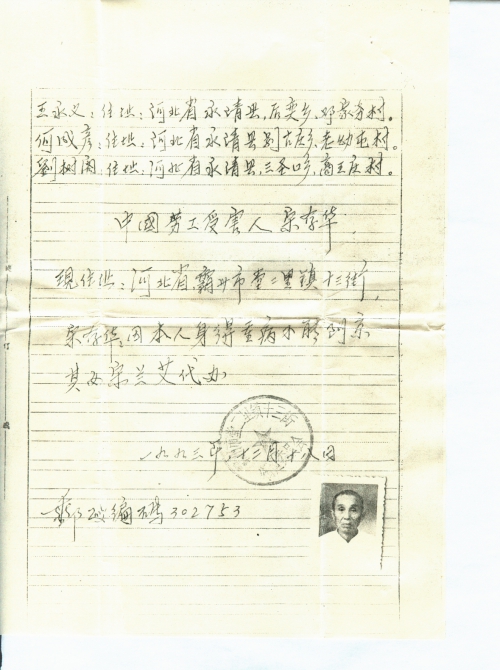Date of letter:1993-12-18
Address of author:Bazhou City, Hebei Province
Date of event:1942-1945
Location of event:Hebei Province
Name of author:Song Cunhua
Name(s) of victim(s):Song Cunhua
Type of atrocity:Slave Laborers(SL)
Other details:In 1942, the Japanese soldiers caught many people including me in Daqing River of Hebei Province. On the way to Japan by ship, I thought that I had no choice but to die if I arrived in Japan, so I jumped into the sea. However, I was found and salvaged. The Japanese soldiers tied me to the railing of the ship, and took turns to beat me while making a gesture, which meant that anyone wanted to escape would be beaten like me. In Japan, we were often beaten, and did not have enough food and clothes. Some died there. In March 1946, we, the survivors returned home.
Petition
Strongly demand the Japanese government to offer compensation to Chinese slave labors!
China only abandoned war compensation between governments, but it has never given up civilian damage compensation.
Looking back at my unforgettable pain: It was in January 1942, the Japanese Invasion Army captured many Chinese slave slave labors during mopping-up campaign in the north of Daqing River, Hebei Province, and sent them to Tanggu Concentration Camp. I was also caught. At that time I was wearing a gold ring on the finger, and I was afraid it would be discovered and taken away by the Japanese, so I secretly placed the ring on the toe when pretended to put on shoes. On the way to Japan, I thought the Japanese were so overbearing even in China, after we arrived in Japan, we definitely would be tormented to death by the Japanese. Therefore, I jumped into the sea from the ship. After I floated away 6 li(1 li equals about 0.5 kilometers), I was discovered by the Japanese, and they dispatched steam boat to take me back, escorted me to the ship, and tied me on the railing. The Japanese hit my face in turn, and cursed me while making gestures. It looked they were educating others on the boat by using myself an example. My fellow slave labors couldn’t stand it any longer, so they walked up and squeezed the Japanese to one side to protect me. They said: “We are all Chinese, and you cannot be beaten to death by the Japanese.” With protection from my fellow slave labors, I narrowly missed death. Although I survived, when I woke up, I found the gold ring on the toe was gone. We Chinese slave labors were escorted to Tsukino Village, Tone County, Gunma Prefecture in Japan. After leaving the train station, we walked south about 6 li till reaching a mountain gully, which was rumored to be a hydraulic power plant. We slave labors were forced by the Japanese foreman Sato and Sataka to work from morning till night, dug mountain caves. Despite the heavy labor, we ate swine food and dog feed, sometimes we were so hungry that we had to secretly go to the slope to dig wild vegetables. If discovered by the Japanese (foreman), one would receive whipping and heavy beating with stick.
When we were working as slave labors in Japan, in winter there was no cotton-padded garment, in summer we had no unlined clothing, and were given with only loincloth, working in naked body. In this way the Japanese foreman often beat and cursed our Chinese slave labors, saying we were bastards (Bakayarou). Some Chinese slave labors were beaten to death by the Japanese foreman, others found it intolerable to withstand the beating from the Japanese foreman, and committed suicide by jumping down the mountain cliff. If any slave labor was captured by the Japanese foreman after escape, they would be killed by Japanese hounds. The Japanese foreman said: “You Chinese have no way to escape”. Many Chinese slave labors died because of ill treatment, and a lot of Chinese slave labors developed all kinds of disabilities because of lack of medical treatment after receiving injury. My leg was disabled because of beating. Among the originally more than 400 Chinese slave labors, only a little over 130 persons survived by the end of 1945 when Japan surrendered. It was such hard life, but we tolerated four years. In March 1946, it was with help from the US Army that we were able to return to Qingdao in the motherland, where the Red Cross Society received us. I strongly demand the Japanese government to give compensation.
1. I worked as slave labor in Japan for four years, and suffered four years of hardship, so I should be compensated with four years salary USD 40000.
2. Mental anguish should be compensated with USD 5000.
3. When working as slave labor in Japan, my left foot was disabled,
which should incur compensation of USD 5000.
Totaling USD 50000
Reference:
Li Zhongyuan: Address: Lao Village, Sanshengkou Town,
Yongqing County, Hebei Province
Wang Yongyi: Address: Dengjiawu Village, Houyi Town,
Yongqing County, Hebei Province
He Chengyan: Address: Laoyoutun Village Bieguzhuang Town,
Yongqing County, Hebei Province.
Liu Shuge: Address: Shangwuzhuang Village, Sanshengkou Town, Yongqing County, Hebei Province
Chinese slave labor victim: Song Cunhua
Current address: Thirteenth Street, Tangerli Town, Bazhou City, Hebei Province
Song Cunhua: Because I am unable to go to Beijing due to serious illness, my daughter Song Lanai will act as my proxy on my behalf.
December 18, 1993
Bazhou City Tangerli Town Thirteenth Neighborhood Committee (Villager Committee Seal)
Postal code: 302753















